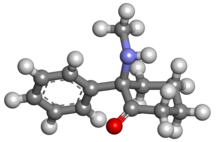Deschloroketamine (DXE, DCK, 2'-Oxo-PCM) is a dissociative anesthetic[1][2] that has been sold online as a designer drug.[3][4][5][6][7] It has also been proposed for the treatment of bacterial, fungal, viral or protozoal infections and for immunomodulation at doses of 2 mg per day.[8]
 | |
 | |
| Legal status | |
|---|---|
| Legal status |
|
| Identifiers | |
| |
| CAS Number | |
| PubChem CID | |
| ChemSpider | |
| UNII |
|
| ChEMBL | |
| CompTox Dashboard (EPA) | |
| Chemical and physical data | |
| Formula | C13H17NO |
| Molar mass | 203.285 g·mol−1 |
| 3D model (JSmol) | |
| |
| |
Legal status
editDeschloroketamine is illegal in Latvia,[9] and is covered by blanket bans in Canada and the UK.[citation needed]
See also
editReferences
edit- ^ Robins EG, Zhao Y, Khan I, Wilson A, Luthra SK, Rstad E (March 2010). "Synthesis and in vitro evaluation of (18)F-labelled S-fluoroalkyl diarylguanidines: Novel high-affinity NMDA receptor antagonists for imaging with PET". Bioorganic & Medicinal Chemistry Letters. 20 (5): 1749–51. doi:10.1016/j.bmcl.2010.01.052. PMID 20138515.
- ^ US 3254124, Stevens CL, "Aminoketones and methods for their production", published 31 May 1966
- ^ Frison G, Zamengo L, Zancanaro F, Tisato F, Traldi P (January 2016). "Characterization of the designer drug deschloroketamine (2-methylamino-2-phenylcyclohexanone) by gas chromatography/mass spectrometry, liquid chromatography/high-resolution mass spectrometry, multistage mass spectrometry, and nuclear magnetic resonance". Rapid Communications in Mass Spectrometry. 30 (1): 151–60. Bibcode:2016RCMS...30..151F. doi:10.1002/rcm.7425. PMID 26661982.
- ^ "Alerta: descloroketamina vendida como ketamina en Barcelona" (in Spanish). Energy Control. Retrieved 2 October 2015.
- ^ Villalba J (27 March 2015). "Los efectos desconocidos de la sequía de ketamina" (in Spanish). Vice. Retrieved 2 October 2015.
- ^ Knibbs J (22 October 2015). "Party-drug testing shows its worth". The Medical Republic.
- ^ Hájková K, Jurásek B, Čejka J, Štefková K, Páleníček T, Sýkora D, Kuchař M (October 2019). "Synthesis and identification of deschloroketamine metabolites in rats' urine and a quantification method for deschloroketamine and metabolites in rats' serum and brain tissue using liquid chromatography tandem mass spectrometry". Drug Testing and Analysis. 12 (3): 343–360. doi:10.1002/dta.2726. PMID 31670910. S2CID 204975994.
- ^ DE 4409671, Preiss D, Tatar A, "Use of 2-methylamino-2-phenylcyclohexanone for the treatment of bacterial, fungal, viral or protozoal infections and for immunomodulation", published 23 May 1995
- ^ "Noteikumi par Latvijā kontrolējamajām narkotiskajām vielām, psihotropajām vielām un prekursoriem" [Regulations on Narcotic Drugs, Psychotropic Substances and Precursors Controlled in Latvia] (in Latvian). Ministry of Health of the Republic of Latvia. Archived from the original on 4 March 2016. Retrieved 29 October 2015.